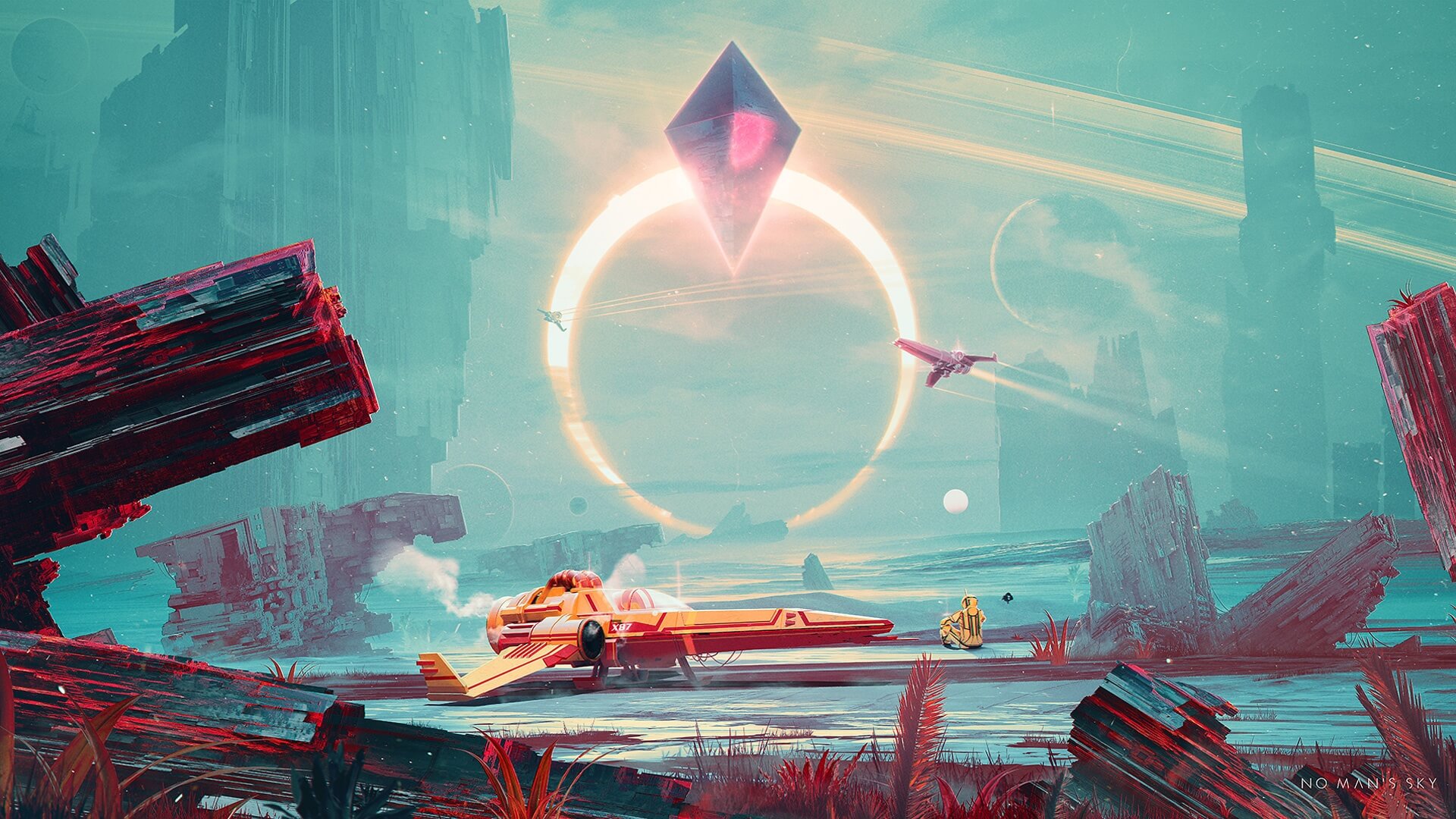Title: No Man’s Sky
Version Tested: PS4
Available On: PS4, PC
Developer: Hello Games
Publisher: Hello Games
Genre: Action-adventure
Official Site: No Man’s Sky
Release Date: 08-09-16
Where To Buy: PSN Store, Steam
No Man’s Sky is the indie game that has been receiving AAA hype since 2014, consequently setting our expectations high. It is a first-person space exploration title which boasts an infinite procedurally generated galaxy of roughly eighteen quintillion planets – all of which are filled with unique creatures, unpredictable weather conditions, and resources that have to be mined in order to further your expedition. In other words, all those years of your mother reminding you that “patience is a virtue” is about to pay off.
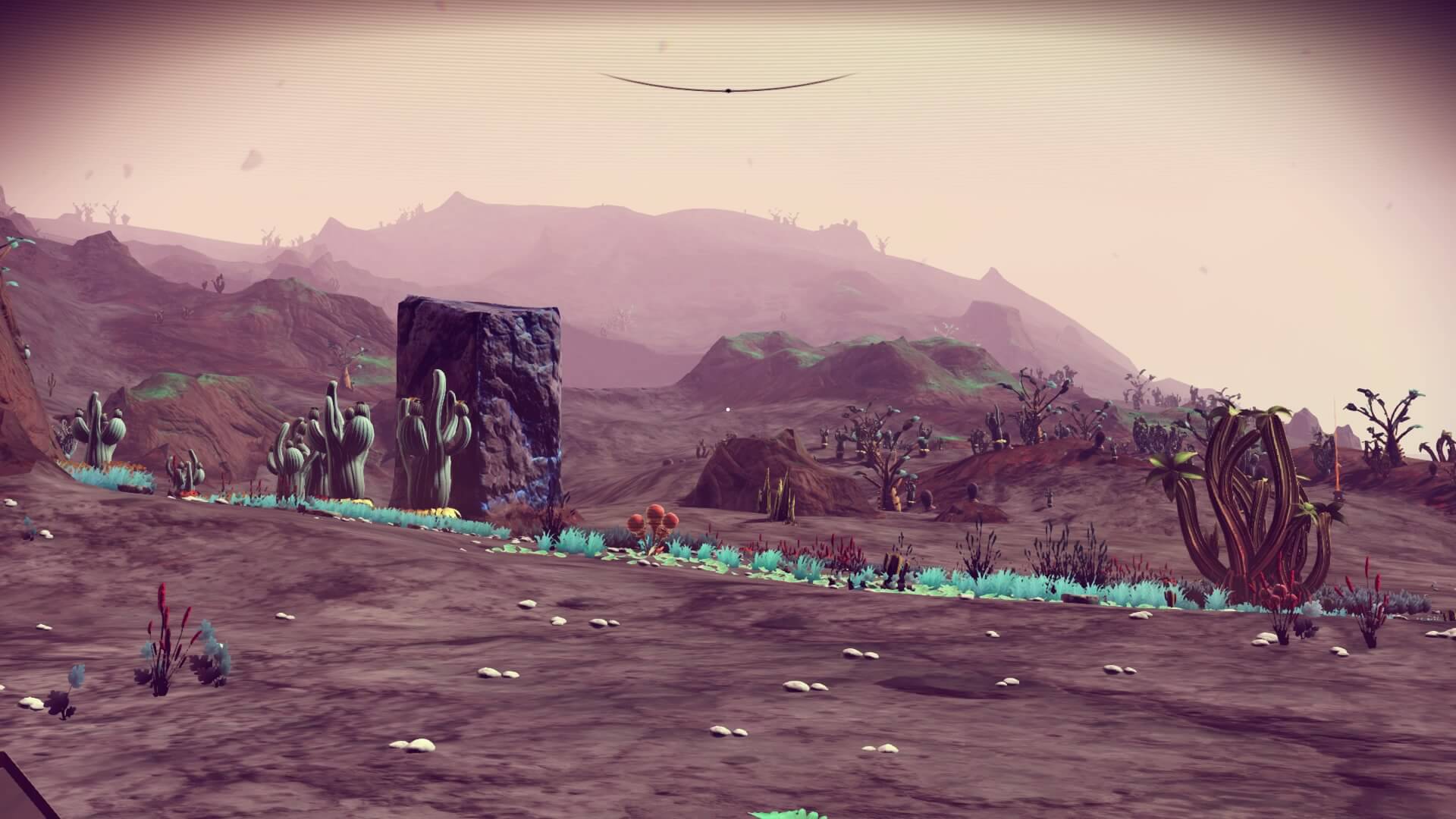
The basics of No Man’s Sky are revealed as soon as you wake up on your starting planet with a busted ship in need of repair. You are thrust into the action with no tutorial and no sign that what you are doing is incorrect. By this point, it has been ingrained in me to expect some kind of helping hand at the beginning of a game, and the fact that No Man’s Sky ditches this approach is both refreshing and overwhelming as I was forced to take exploration into my own hands. It is definitely not for the impatient. There are three crucial menus in need of understanding (your exosuit, starship, and multi-tool), as well as the general mechanics of gameplay. The number of slots in each menu is skimpy in the beginning, and it required me to be strategic about what I was going to keep or toss.
The technology in your multi-tool is necessary to mine resources such as plutonium, carbon, iron, and many other elements so that you can eventually leave your planet and head into space. The novelty of roaming that first planet reinforced the high expectations I had for the game. The music is beautifully integrated into the environment and each sound, from the wind down to your footsteps and heavy breathing upon running out of stamina, is realistic and atmospheric. That desire to explore only grew when I entered space for the first time. It was then that I truly understood how ambitious this game really was.
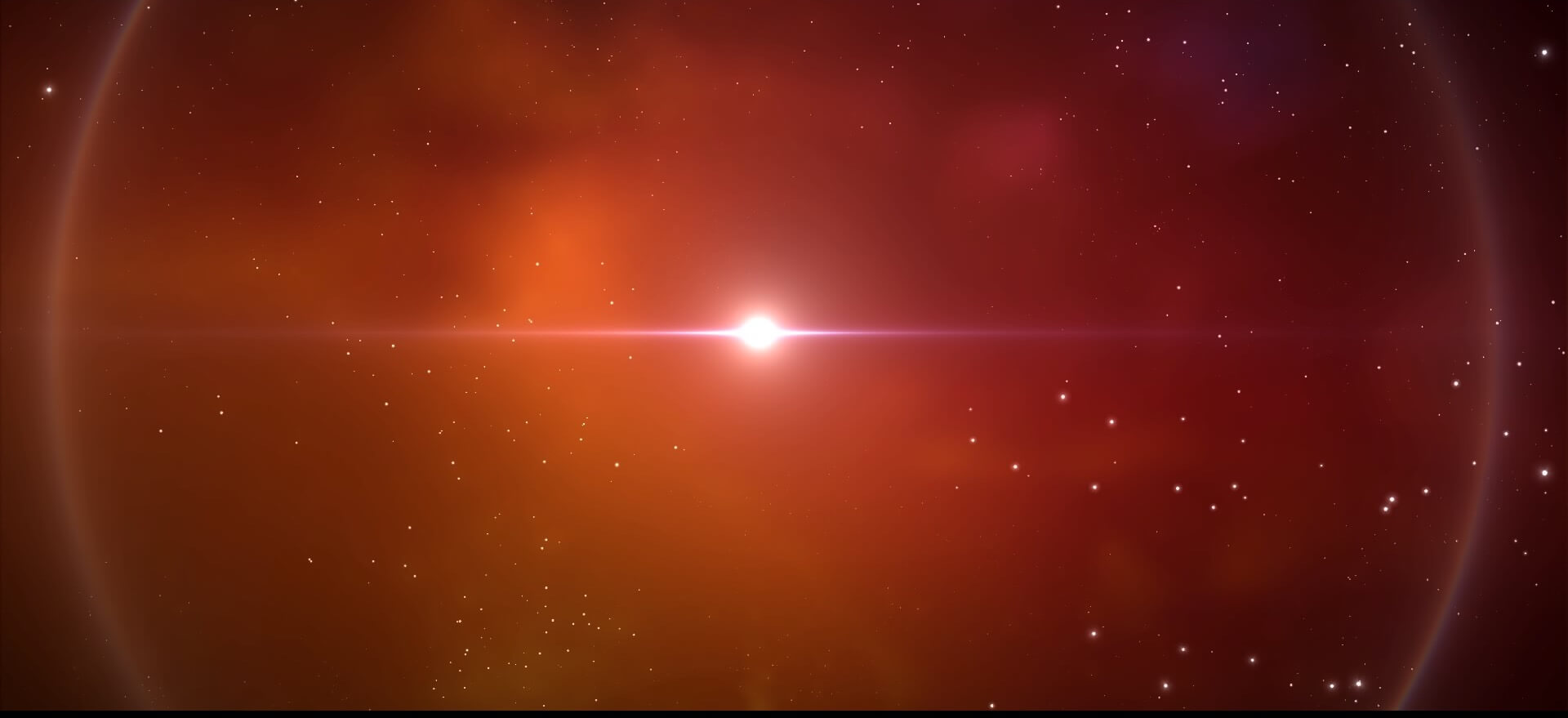
However, once I grew more comfortable with the controls and navigating the menu, the novelty and wonder of No Man’s Sky wore off. The slow gameplay and heavy repetition were inescapable. It was difficult to be wowed or excited by buildings, monoliths, or creatures that I had seen a dozen times before, just in a different landscape. By the third planet, I knew what to expect. Conditions may be colder, wetter, or hotter depending on the planet, but adapting did not present much of a challenge.
Little is at stake and the urgency to ‘survive’ was lost on me since the majority of the planets I discovered had an abundance of zinc – one of the resources needed to keep up the Hazard Protection. Nothing was particularly new except for the distorted creatures, which aside from cashing in the units you get for discovering them, added very little to the planet’s environment; and quite honestly, some of them are just plain creepy – a combination of limbs, tails, and heads from other animals just meshed together to create a new, “unique” one.
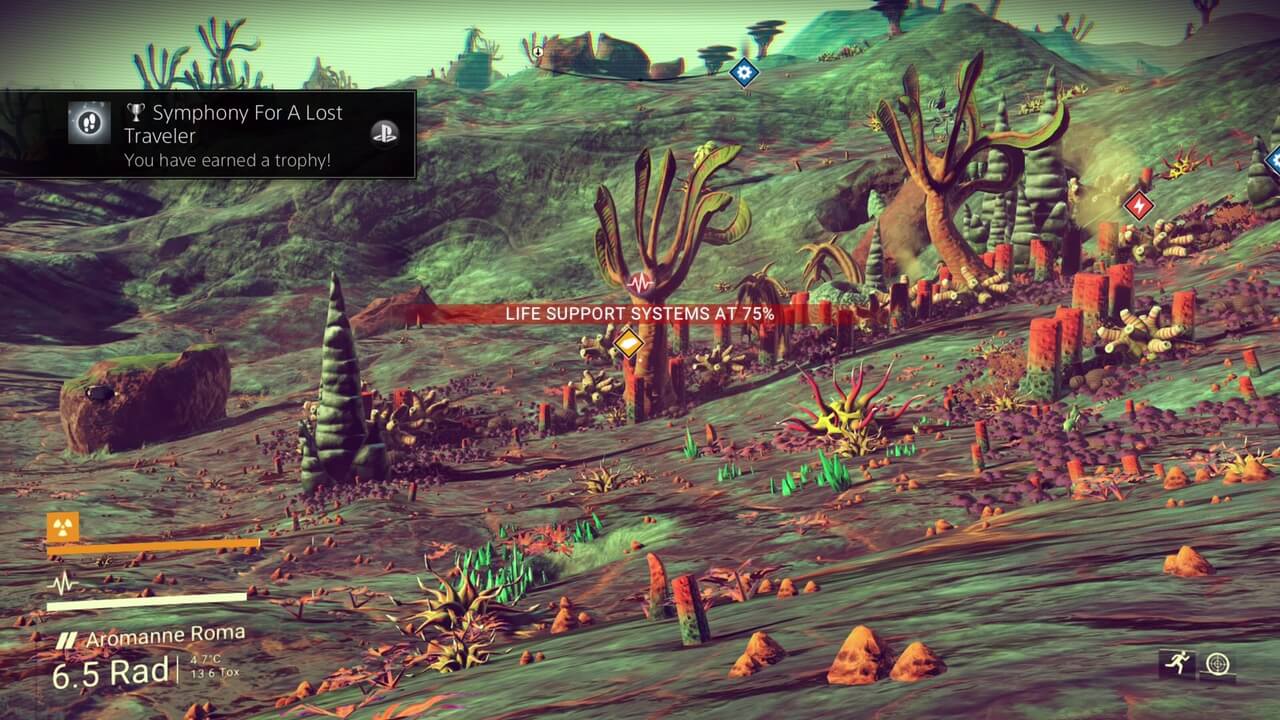
It is hard to break down the “objective” of No Man’s Sky, because at its core, there really isn’t one. The ultimate goal, obviously, is to reach the sun at the center of the universe, but the galaxy is so expansive that such a feat was not at the forefront of my mind. With eighteen quintillion planets sitting out there, there are a number of directions you could go in, provided you have the ample Hyperdrive to do so. The galaxy caters to exploration, and the sheer magnitude of No Man’s Sky gives you the hopeful sense that endless possibilities await. Unfortunately, the majority of this exploration became aimless after several hours, and there are only so many resources I can mine and trade before losing interest. After spending a lot of time with this game, it became clear that the same elements that make No Man’s Sky unique also prove to be its biggest flaws.
Planet number two starts to feel (and look) a lot like planet twelve and twenty. The first hour or so that you spent on your “home” planet, resembles the experience that you have on a different one in a system far, far away. Despite there being a menu to keep track of where you have been, the planets blur together so greatly that they become forgettable moments of exploration and discovery.
Another aspect that has both positive and negative effects is the lack of a standardized loading screen. The gameplay is smooth and it adds to the seamless quality of traveling through the galaxy. The downside? When you come into planets at high pulse drives or even just rotate the camera around while standing still, the procedurally generated environment shows its hand, as the world materializes around you in fuzzy pixels. Considering the scope of the game, this is actually a small grievance. It is still one that had me sighing often.
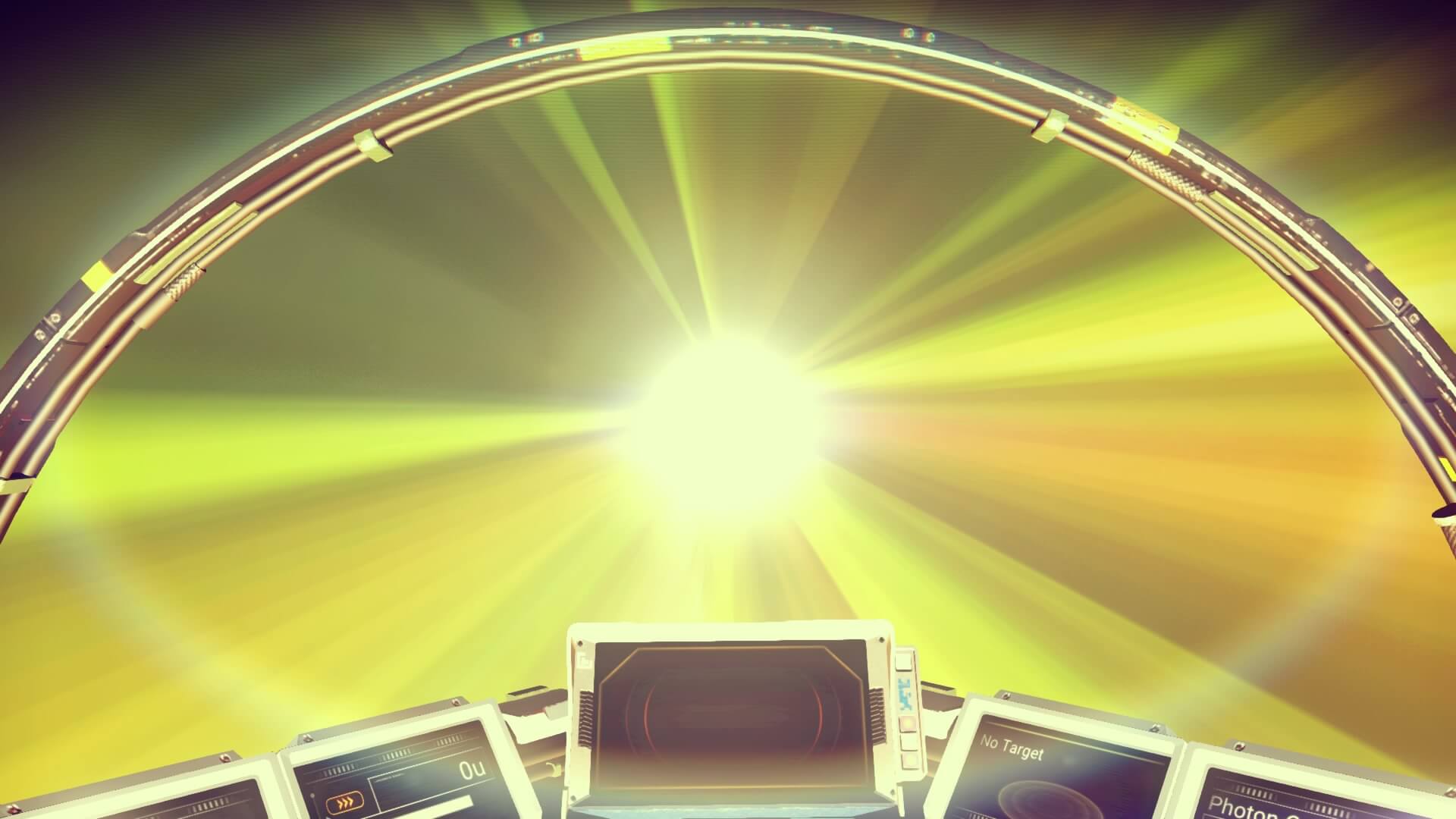
Despite all of this, one of my biggest issues with No Man’s Sky lies in the space combat. The attack ships are randomly generated and the battles are frustrating. The mechanics of fighting in space are just downright clunky. It is challenging to repair your protection shield while being shot at by other ships in real time. If you die in space, you are sent to that galaxy’s space station and have to fly back to your “grave” in order to collect your lost resources. Although I took the time to adequately build up my ship, these were fights that I did not look forward to.
Self-motivation is a large part of playing No Man’s Sky. It has to be. Otherwise, there is little purpose or enjoyment in doing the exact same thing over and over again on planets that look like ones you have already been to. For the universe to be as large as it is, the repetitive nature of the game is underwhelming. It helped for me to merge my expectations with the reality of No Man’s Sky and ask myself what I wanted my experience on a certain planet to look like- Did I want to upgrade my exosuit? Mine resources and trade them for units? Did I want to achieve journey milestones and collect trophies? Collect knowledge stones and up my alien communication game?
Ultimately, the choice has to be yours, because the aimless wandering gets old fast, and the “point” of the game feels like it is falling on deaf ears after a couple of hours. Not everyone will play No Man’s Sky the same way, nor are they meant to. However, the experiences we are all having on these eighteen quintillion planets may not be as dissimilar as we were previously made to believe.
- Gameplay: After the initial excitement wears off, gameplay is repetitive and slow
- Graphics: Planets are visually beautiful despite their content being generated before your eyes
- Sound: Incredible, atmospheric sound throughout
- Presentation: Massive world is ambitious but has its flaws
[review]

